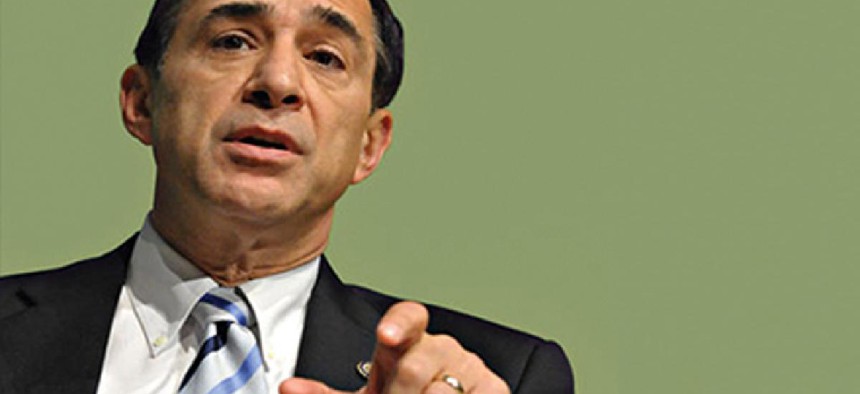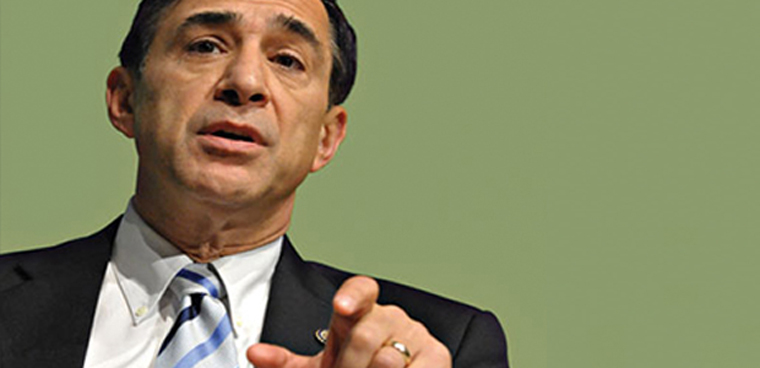Issa takes aim at federal security protocols

A House committee held a closed hearing to discuss potentially sensitive information related to the security of the HealthCare.gov website.

House Oversight and Government Reform Chairman Darrell Issa says subpoenaed documents prove the HealthCare.gov website had serious potential security risks when it launched Oct. 1.
California Republican Rep. Darrell Issa continued his probe into possible security failures accompanying the flawed Oct. 1 launch of HealthCare.gov – this time behind the closed doors of a hearing held in executive session to prevent potentially sensitive documents from being released to the public.
The Jan. 28 hearing was a departure from the recent practice of Republicans on the House Oversight and Government Reform Committee, which Issa chairs. As part of an ongoing probe, the panel has subpoenaed security records from private contractors connected to the project and published selections of them online, as part of an effort to document the concerns expressed by private contractors and security experts inside the Centers for Medicare and Medicaid Services that HealthCare.gov launched with serious potential security risks.
"Documents obtained by this committee by subpoena ... show that security officials at CMS had recommended that this site be delayed, not launched, or launched only in part," Issa said in an opening statement, before a vote to close the hearing to the public.
The Department of Health and Human Services and the non-profit Mitre Corporation, which conducts cybersecurity research on behalf of the federal government, have expressed concern about airing the contents of the HealthCare.gov security documents in open session, noted ranking member Elijah Cummings (D-Md.) "Some of the security testing documents we have obtained contain highly sensitive information, and could provide a road map for hackers and others seeking to do us harm," Cummings said.
Kevin Charest, chief information security officer at HHS, and Milton Shlomo, principle information systems engineer at Mitre, testified at the closed hearing. In a public hearing of the same committee on Jan. 16, Charest told lawmakers, "to date, there have been no successful security attacks on HealthCare.gov, and no person or group has maliciously accessed personally-identifiable information from the site."
In his opening remarks on Tuesday, Issa took aim at the current practice, under the Federal Information Security Management Act, of relying on the judgment of high-ranking executive branch officials to launch IT systems.
"Under current law, it is possible to launch a site by simply saying that an executive within the administration of the right level has the ability to accept the risk," Issa said. Such a practice is "almost the assurance that the American people's personal identifiable information will be compromised. There is no protection against a judgment call that the risk of billions of dollars, trillions of dollars, the entire economy can in fact be waived by an administration official. Meaning, there is no standard other than the acceptance of risk," Issa said.
Agencies are required to issue an authority to operate declaration to launch an IT product like a public-facing website. An ATO documents potential risks to agency operations, according to classifications spelled out by the National Institute of Standards and Technology. Issa has pressed the argument that the decision to grant an ATO to HealthCare.gov by CMS administrator Marilyn Tavenner had more to do with the politics of hitting the advertised launch date than with the operational security of the components of HealthCare.gov.
"It is the committee's intent to err on the side of the assumption that the administration continues to lie about the site being safe and secure. We can find no other basis but to assume that they were lying about the vulnerabilities on the day they went live on Oct. 1, and that they are still lying," Issa said.



